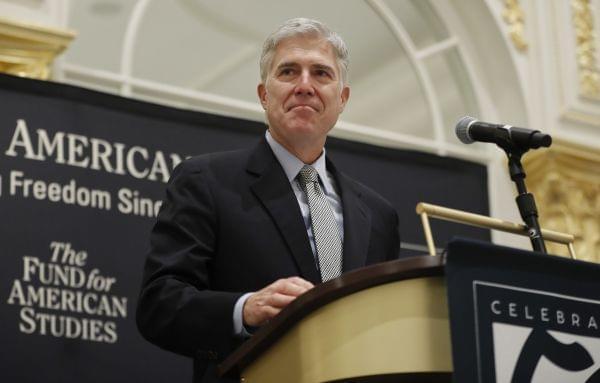Supreme Court, New Term Near, To Hear Challenge To Unions

Supreme Court Justice Neil Gorsuch speaks at the 50th anniversary of the Fund for America Studies luncheon at the Trump Hotel in Washington, Thursday, Sept. 28, 2017. Gorsuch could prove to be the deciding vote in an upcoming union case. Pablo Martinez Monsivais/AP
WASHINGTON (AP) — Its conservative majority restored, the Supreme Court said Thursday it will return to an issue with the potential to financially cripple Democratic-leaning labor unions that represent government workers.
After the justices deadlocked 4-4 in a similar case last year, the high court will consider a free-speech challenge from workers who object to paying money to unions they don't support.
The court, with conservative Justice Neil Gorsuch on board, could decide to overturn a 40-year-old Supreme Court ruling that allows public sector unions to collect fees from non-members to cover the costs of negotiating contracts for all employees.
The union fees case is among nine new cases the justices added to their docket for the term that begins on Monday. Others deal with a defendant's right to direct his own defense, police searches of vehicles and overtime pay for service advisers at car dealerships.
Labor unions have been under sustained attack at the high court in recent years. The latest appeal is from a state employee in Illinois. It was filed at the Supreme Court just two months after Gorsuch filled the high court seat that had been vacant since Justice Antonin Scalia's death.
The stakes are high. Union membership in the U.S. declined to just 10.7 percent of the workforce last year, and the ranks of private-sector unions have been especially hard hit.
About half of all union members now work for federal, state and local governments, and many are in states like Illinois, New York, and California that are largely Democratic and seen as friendly toward unions.
Labor leaders criticized the court for taking up the case. "This case is yet another example of corporate interests using their power and influence to launch a political attack on working people and rig the rules of the economy in their own favor," said Lee Saunders, president of the American Federation of State, County and Municipal Employees.
But National Right to Work Legal Defense Foundation president Mark Mix said the court was poised to protect employees' rights.
"With the Supreme Court agreeing to hear the Janus case, we are now one step closer to freeing over 5 million public sector teachers, police officers, firefighters, and other employees from the injustice of being forced to subsidize a union as a condition of working for their own government," Mix said.
The Illinois case involves Mark Janus, a state employee who says Illinois law violates his free speech rights by requiring him to pay fees to subsidize AFSCME, which represents tens of thousands of Illinois workers. About half the states have similar laws covering so-called "fair share" fees that cover bargaining costs for non-members.
Janus is seeking to overturn a 1977 Supreme Court case, Abood v. Detroit Board of Education. It said public workers who refuse to join a union can still be required to pay for bargaining costs, as long as the fees don't go toward political purposes. The arrangement was supposed to prevent non-members from "free riding," since the union has a legal duty to represent all workers.
A federal appeals court in Chicago rejected Janus' claim in March. Gorsuch was confirmed in April and the appeal was filed in June.
Scalia died in February 2016, just a month after the justices heard a similar case from California. The court seemed ready to overrule the 1977 case, and the 4-4 tie the court announced in March of that year almost certainly meant that Scalia, not typically a friend of unions in high court cases, would have been part of the majority ruling against them.
The justices will hear argument in the winter.
Links
- AFSCME Members Vote To Authorize Possible Strike
- Rauner Should Personally Negotiate With AFSCME: Manar
- AFSCME Members To Vote On Strike Authorization In Illinois
- Judge: State, AFSCME Should Continue Talks Over Wages, Health Benefits
- Rauner Laughs At Cullerton Suggestion That Pensions, AFSCME Contracts Are Tied
- Contract Talks Stalled Between AFSCME And Gov. Rauner
- The Players: Who Decides If AFSCME And Rauner Are At An Impasse? Here’s Who.
- Democrats Look To Win Back Union Vote
- Rauner Takes Union Fight To Illinois Supreme Court
- Campus Unions Seek Meeting With U Of I President

